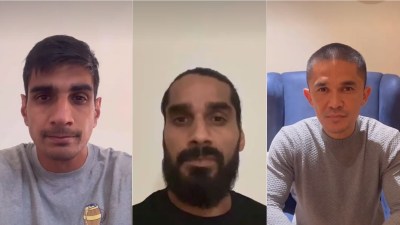Streetfighting fears
On a perfect morning in Srinagar last week as I sat on the roof of a houseboat on the Dal Lake listening to happy, hopeful tales of the Vall...

On a perfect morning in Srinagar last week as I sat on the roof of a houseboat on the Dal Lake listening to happy, hopeful tales of the Valley8217;s first real tourist season in a decade, news came of the explosion in Sabzi Mandi. Six people were killed and a Brigadier was among those injured. In seconds all hope was dissipated and no longer did the morning seem made of sunlit glass. Silence descended and a desperate sort of sadness. The houseboat-owners I was talking to looked helplessly at their feet. What was left to say?
As someone who has followed events in Kashmir closely for more than twenty years let me begin by saying that the big change today is that the insurgency no longer has public support. Kashmiris I talked to in the three days I spent traveling around the Valley said the majority of people now hated the militants and longed for peace. There was also realisation, they said, that the world had changed since September 11 and changed in a way that made an independent state of Jammu 038; Kashmir seem about as likely as Osama bin Laden being invited for an intimate weekend in Camp David. The problem is that once the terrorist genie is out of the bottle it is very hard to shove him back.
This is doubly true when, as in Kashmir and Punjab, terrorism has a shaky kind of religious sanction. Semi-literate priests running semi-literate religious schools were largely responsible for allowing the roots to go deep. Not so much by openly preaching violence or hatred but by preaching medieval ideas that should be meaningless in today8217;s world. In Punjab the good Sant Bhindranwale and his acolytes tried, in the manner they dressed and talked, to recreate the seventeenth century world in which Guru Govind Singh was hero and god. In Kashmir, as in other parts of India with large Muslim populations, there has been in recent years a concerted attempt to go back to the world in which the Prophet lived. Not by trying to understand it historically or even in a spirit of real analysis but on the dubious basis of interpretation by semi literate-maulvis.
It has been a recipe for disaster because its main consequence has been that Islam has become increasingly less a private religion and more one that seeks to impose its ideas and worldview on everyone else. Pretty much the same thing happened in Punjab when, for a while, there was more than a degree of support for Bhindranwale from Sikhs who saw him as a saviour of the Sikh faith. Just by way of a small illustration may I say that in both Kashmir and Punjab I found myself, at the height of the militancy, in direct confrontation with young men who insisted that I cover my head or wear long sleeves or whatever the medieval fashion idea of the moment was. How do you fight this kind of stupidity? Who even has the time for it and yet you are obliged to either fight it or follow. There is no other way, so most people end up following and that is where the trouble begins.
In Kashmir the very nature of Islam has been changed to make it more rigid and more intrusive into matters that should be private and since this has got mixed up with what was essentially a political problem we now have a jehad that cannot be put back in the bottle. Our friendly, neighbourhood military dictator has faced similar problems since September 11, when he hurriedly shifted sides from the Taliban to the Americans. It was just as hard for him to push the genie of terrorism back into the bottle so Pakistan has paid its own price particularly because General Musharraf has the unique distinction of wanting to shove the genie only half way back. He wants the jehad to continue in Kashmir but end in Afghanistan and the Americans, preoccupied with Iraq and other matters, have chosen so far to look the other way.
It is, perhaps, appropriate that in the week of the second anniversary of September 11, Ariel Sharon should have become the first Israeli Prime Minister to visit India. Who knows but our blossoming friendship with Israel could help Washington see that the lines in the global war on terrorism have to be drawn more clearly.
Who is going to take the war seriously if Saudi Arabia and Pakistan continue to be honoured allies of the Bush administration? Is Iran really that much worse? If the lessons of September 11 remain unlearned in Washington they remain unlearned here as well which is why we could be losing our own fight against militant Islam. We cannot fight militant Islam if the Indian justice system makes justice impossible for those who suffered in Gujarat. We cannot fight militant Islam as long as it remains the only recourse for those who believe they will always be denied justice by the Indian state.
Only when the state is seen to be fair will it be possible for our leaders to state in the clearest possible terms that there is no room for militant Islam in India. There are those who will say that I should add that there will be no room for militant Hinduism either but the truth is that there have so far been no Hindu suicide bombers and no Hindu terrorist groups so a distinction has to be made. It would be dangerous if mistaken ideas of political correctness prevented us from making it and that is only one of the lessons we should have learned after September 11.
Email the Author
- 01
- 02
- 03
- 04
- 05































